- Home
- Annie Proulx
Bad Dirt Page 12
Bad Dirt Read online
Page 12
In this mood, one day, driving through the empty reaches west and north of Muddy Gap, he began to think about dinosaurs. They had been here in the ancient steamy swamps tearing foliage from tropical trees, kicking huge wounds in one another’s bellies with claws like scimitars. Their fossilized bones and stony footprints were everywhere. In the midst of these thoughts he slipped a CD into the player without looking at it. Let it be a surprise.
A fine net of clustered organ notes sounded, mournful and slow. He did not know the music and turned up the volume to overcome the engine’s hum. Without warning a gigantic bass huffing and snorting smote him. The loudness stunned him, seemed to blow a hole in his chest. The sound seemed so intensely dinosaur-like that he almost screamed. The frail wandering notes returned, then again the ghastly roars. What in the name of god was he listening to? In his mind this music, the dinosaurs, the roaring organ all merged. The power of the organ made it the correct instrument for this landscape. With shuddering flesh and electric current coursing up his spine he could hardly bear it, the perfect fit of this music to the tawny ground, the abrupt buttes, distant fan of peaks, the monstrous scale of geologic time.
At home again he tore through his CD collection looking for organ music. There wasn’t much—Arvo Pärt’sAnnum per annum, theTrivium pieces, and a few others. He played these on his next drive and found that the Issey Miyake accordion pleats of the Ferris Mountains fit Pärt’sMein Weg hat Gipfel und Wellentäler, with its questing sonic waves. He experienced the most intense pleasure in being alone, in swallowing the landscape in great chunks, drowning in the heavy surf of sound, the transmutation of geology into music.
Another time, driving, he noticed a filthy yellow haze lying over the Wind River range. He stopped for gas at a tiny convenience store in the sage and asked the old man behind the counter what it was, dust maybe?
The old man, his face so warted and freckled it seemed made of gravel conglomerate, rolled his eyes. “Pollution. It’s smog. Comes from that goddamn Jonah infill methane gas project. One well ever ten acres. Never seen that smog before in Wyomin. You’re seein her start to die. The whoremasters got ahold a her. They got her down on her knees and any tinhorn with five bucks in his jeans comes by they put the prod pole to her and say, ‘suck his dick.’”
Mitchell found the image raw and offensive and consoled himself with the belief that the old man, out in the middle of nowhere, didn’t know what the yellow haze was and seized on a scapegoat.
As he drove on he let himself face the truth; that there was much more to understanding the place than driving back roads and fitting music to abrupt topography, and that he was too late. He longed to go on foot into the difficult terrain of the Absarokas, where there were still grizzlies and mountain lions, into the Beartooths, the Wind River and the Washakie ranges, into the Thoroughfare and the Yellowstone backcountry, but was defeated by his ignorance of these most unforgiving, roadless wildernesses.
In March winter briefly cracked open. The wind changed to a warm Chinook. The meadows trickled with sheets of water from melting snowdrifts. The thermometer touched seventy. Overnight this balmy weather swallowed its own tail and the temperature fell as though drop-kicked off a cliff. The next morning a black roll cloud crushed the landscape and blasted the icy prairie with billows of snow.
“Spring blizzard,” said Mitchell, irritated at being housebound. He gathered up a pile of wildlife magazines and papers, touched a match to the kindling in the fireplace and settled in for a day of reading. He had become aware of the euphemisms for “killing”— harvest, put down, euthanize. He understood the wildlife of the place as well as the undisturbed country was under assault. Awful diseases were sweeping through the wild creatures—chronic wasting disease, whirling disease, mysterious die-offs teamed with loss of habitat and encroachment on ancient migration routes. He knew he was seeing the end of this wild world and time. Of course, thought Eugenie when she heard the clink of the decanter lip on his glass, he would not sit by the fire without his whiskey.
It was nearly noon when Eugenie, making a ham and cheese casserole, heard Mitchell curse. There was the sound of shattering glass, and she guessed he’d thrown or dropped his whiskey glass on the stone hearth.
“What is it?” she called.
He came shaking into the kitchen, the paper in his hand making a sound like the slats of a venetian blind in an open window.
“Thesemonsters !” he said. He held the paper out to her, and she read of a teenager who, gathering decorative landscape stones with his mother and brothers, had on his ATV run a pronghorn to exhaustion, roped and dragged it for a mile behind his machine, stabbed out its eyes, cut off its testicles, and finally set his dogs on the unfortunate animal while his mother and brothers looked on, laughing.
“Oh no,” said Eugenie. Mitchell looked as though he were going to vomit. Eugenie handed the paper back to him. He folded it savagely. There was the squeak of the oven door as Eugenie slid the casserole in. She turned back to Mitchell, sensing his vulnerability as a fox senses the mouse’s tunnel beneath the snow.
“Go ahead,” said Eugenie. “Nowtell me how much you like it here.” And with that they both knew a lever had been inserted in the crack and that it would be prised open.
She began by berating the relentless wind, the storm even then holding them prisoners, the sputtering power outages, veered to the Swift Fox store where people talked about them behind their backs. Mitchell stood silent, and she knew he was not hearing her, that he was thinking about the antelope. So she told him about the maniac crawling out of the trees.
“That was the point at which I’d had it,” she said. “I’m going back. You can stay here if you like it so much. Go native. Get yourself an ATV and a gun and a knife.”
“A man crawling out of the trees? He was probably lost or something. What did you do?”
“I called the stupid sheriff’s office and hours later this fat woman came in the sheriff’s car and that old rancher woman in her black Jeep. They got him and took him somewhere, I don’t know where. Probably the hospital. The woman said he had a broken leg.”
Of course, thought Mitchell, Eleanora Figg had to be there when Eugenie broke the cardinal rule of the country—that you give aid and help to a stranger, even your bitterest enemy when he is down.
“We won’t be able to stay here,” said Mitchell. “This is bad.”
“Stayhere? Who the hell wants tostay here. I have had it. Do you get that?”
“Yes,” said Mitchell, wallowing through the deep snow and trees toward the open.
“I’ll stay with Honor or my parents until I can find my own place. We can sell this damn house and split the money. All I want is to get out.” She was pacing back and forth, the kitchen filling with the savory odor of the casserole.
“Honor will take it hard,” said Mitchell, but Eugenie gave a barking laugh at the moment a knotty stick in the fireplace exploded.
“Honor? You fool, she’s not even your daughter. I doubt she will, as you put it, ‘take it hard.’” She reminded him then of his graduate student intern, told him about Taylor (whose name she now remembered as Tyler), about Dr. Playfire and the failed DNA match before he had his kidney transplant. Mitchell’s narrow face went dirty with pain. In lying retaliation he told Eugenie that the graduate student had been only the first of many.
“Go back to New York and your job and your awful fucking parents,” he said. “But I’m sorry about Honor. I love her as my daughter. I always will.”
“Love?You don’t know anything about love,” said Eugenie. A sharp-shinned hawk seized a chickadee from the window bird feeder and there was a spatter of seed against the glass.
“Harvested,” said Mitchell.
When the roads were clear three days later Mitchell drove her to the Cody airport, where she would get a connecting flight. He had talked on the phone every day with Honor, both of them swearing that whatever the stupid DNA tests showed, she was his daughter, he her father. Sh
e said she would come out in the summer and see him in his new place. If he had a new place by then.
As he drove slowly along the rows of the nearly full parking lot they saw a coyote loping past the cars as though looking for its vehicle. Mitchell, trying to lighten the tension, remarked that it had to be Wile E. Coyote, driving a Mini Cooper from Acme. Eugenie did not smile, but if he had mentioned semis she would have laughed.
Mitchell lugged her large bags and she dragged the smaller one, the tiny wheels making a disproportionate rumble on the rough walkway. He stayed with her in the ticket line. At the two-man security checkpoint they turned toward each other. Nearly everything had been said.
“Goodbye,” said Mitchell, embracing her.
“Yes, goodbye,” she said into his collar.
On the plane she looked down on the last of Wyoming, the black mountain ranges capped and splotched with snow, roads like crimped lengths of yarn from unraveled knitting. From on high it seemed human geometry had barely scratched the land. There were a few roads, an occasional dammed lake. But most of what lay below was great brown and red curves, scooped cirques, rived canyons with unsteady water in the depths, scalloped rocks whose paler layers resembled lace, eroded slopes that seemed clawed by some monstrous garden tool. On a string-like road below, the few vehicles were the size of pinheads, crawling fleas. Was this what Mitchell saw when he went on those long drives, the diminution of self, a physical reduction to a single gnat isolated from the greater swarm of gnats? The absurdity of living one’s life? She thought she would ask him. But of course that did not happen, and any curiosity on the subject was buried under two new ideas—a cowboy kitchen for urban bachelors, and a kind of ranch kitchen with crossed branding irons over the raised hearth to replace the ultramodern German style.
The Contest
THERE COMES A TIME WHENELKTOOTH RESIDENTS NOlonger take an interest in winter. Toward the end of March the count of semis tipped over by the wind fails to amuse and driving the long way around to anywhere—Angle Iron Pass is closed even in a mild winter—has become an odious chore. Elk Tooth residents can take no more of reality. They embrace fads and fancies, and fortunes ride on rash wagers.
A few years ago the idea of a beard-growing contest inflamed the male population. Too late in the season to start then, but the Pee Wee regulars signed an oath (in Guinness, for its ink-like color) to put aside their razors the next winter beginning on the day of the first snowfall. The beards would grow and there would be a prize for the longest, to be presented on the following Fourth of July. A few snowflakes drifted on September 12, andM. J. Speet, the large-animal vet, whose opinions were widely respected, declared the start of the contest.
Amanda Gribb, copying rodeo procedure (the rule of law in Elk Tooth), established a prize purse by collecting ten dollars from each contestant. The only businesses in Elk Tooth were the Elk Tooth bank, the Western Wear & Feed store, and the three bars— Pee Wee’s, Muddy’s Hole, and the Silvertip. Each put fifty dollars in the pot. The propane gas route man pitched in ten but said he’d forgo the chin grass. The money was stowed in a clean mason jar on the mirror shelf at Pee Wee’s.
Twenty-seven contestants, from fourteen-year-old Kevin Cokendall to octogenarian Len DeBock, signed up. Kevin Cokendall’s father, Wiregrass Cokendall, told the kid he didn’t have the chance of a pancake in a pigsty, but Kevin was determined and bought hair restorer with his allowance to help the nascent whiskers along. The other contestants demanded that Old Man DeBock shave before the contest started, as he showed a two-inch frizz in his normal appearance. He shaved, protesting, but it seemed to the others that within days the two-inch frizz had returned. They were heartened when the whiskers seemed to stall at that length without going on to glory. Darryl Mutsch said it was because the hairs were set deep in the crevices and wrinkles of DeBock’s ancient face, great furrows indicating a toothless condition. (The story was that back in the 1950s, at some branding or other, a calf had kicked out DeBock’s front teeth. With the blood seeping down his chin he had picked up the teeth, rinsed them with coffee, and jammed them back into the vacant spaces. When they, and their loosened neighbors, failed he had yanked every one, cowboy style, with a pair of pliers, bracing his forehead against a gatepost for leverage. Over the years he had become an expert on culinary variations of cornmeal mush, his favorite recipe beginning “Take a quart of deer blood…”)
The beards showed odd color and texture variations. Old Man DeBock’s whiskers were short and yellow-white. Deb Sipple’s, as crinkled as ramen noodles, came in black with streaks of grey down each side, and Wiregrass Cokendall showed thick and fiery red bristle in contrast to the anemic blond hairs of his son, Kevin. The Game & Fish warden, Creel Zmundzinski, also grew a red beard, no surprise as his hair all over was the orange-red the paint store called “Mandarin Sunset,” a color that clashed unmercifully with his official red shirt. Hard Winter Ulph, who’d been born during the blizzard of 1949 in some shack south of Wamsutter, showed jet black, pencil-straight whiskers that stuck out like the spines on a hatpin cactus. A suet-faced Englishman with the chewy name of Lobett Pulvertoft Thirkill, working on Fiesta Punch’s ranch for the winter, joined in and contributed a faceful of tan five-o’clock shadow. He was closely watched by Creel Zmundzinski, who knew that men with criminal pasts often took hired-man jobs on remote ranches, and that their warped inclinations found outlet in poaching and carnal knowledge of anything warm. By January the contestants’ facial moss had thickened and lengthened to the point where most could scratch their fingers through the underbrush and delighted to do so. Amanda Gribb complained, for the zinc counter was sprinkled with loose hairs night after night.
“Worse’n havin a cat on the bar,” she said.
Shortly after Valentine’s Day it was clear that three or four men had forged ahead: Darryl Mutsch, Wiregrass Cokendall, Willy Huson (color of mashed sweet potato), and to his father’s chagrin, Kevin Cokendall, whose few whiskers made up in length what they lacked in profusion.
“It’s goin a be terrible a shave all this hay off,” said Mutsch.
Deb Sipple, who did not like to hear references to hay, said it would be easy. “Just cut er down with scissors first, then take you a good hot shower and put on plenty shave cream and you’re home.”
“Best thing is go over to Lander to Thone’s barbershop. He’ll make it easy. Just lay back and let him get it done.”
“No, best way is to go down to Saratoga or over to Thermop to them hot springs and let the waters come up to your nose, then skedaddle for the barbershop before them whiskers dries up and hardens. The sulfur in the water sort a rots the hair or at least softens it up,” said Quent Stipp. “Course the best way would be to bring your razor in the hot pool but I don’t believe they’d allow that.”
“Rots the hair? You must a been duckin beneath the surface pretty frequent,” said Al Mort, looking at Stipp’s retreating hair-line. “Anyhow, I ain’t goin a shave nothin off. Got this far I’ll go end a the rope.”
Although the contest started out with jocularity, it turned cruelly competitive. Questions about beards came up which no one could answer. Amanda Gribb tired of bar arguments that beards were or were not good protection against bronchitis, that vegetarians favored beards more than creophagists, that beards inspired political radicalism. Beard talk made a change from speculation on the whereabouts of Darryl Mutsch’s missing dog, Cowboy George, but none of the questions raised could be answered. Amanda, on her day off, sought out Mercedes de Silhouette, widow of Bill de Silhouette, a sheep rancher who had graduated cum laude from Princeton and over the years amassed a tremendous number of books on diverse subjects. Mercedes had inherited the sheep, the ranch, the house, and its contents, including the books.
“Oh yeah, I still got em. Sold the sheep, kept the books. I dunno why, don’t hardly go in that part a the house. It’s like a liberry in there. Stinks a Bill’s old cigars, too. Like a ghost was in there ever night smokin cigars and readin books.”
Mercedes led the way around knotty pine corners, through loggirdered passageways, into rooms of trophy heads and leather chairs, and at last into a large dim room with a northern clerestory. There were thousands of books from floor to ceiling, in shelved stacks running the length of the space. She switched on the overhead track lights to augment the natural light, and book titles sprang forth:Saddle Galls, The Rooster Book, Into Surinam with Colonel Mascara, and the like.

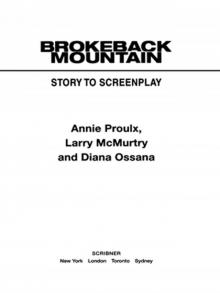 Brokeback Mountain
Brokeback Mountain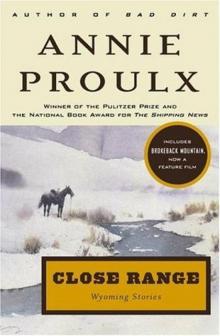 Close Range
Close Range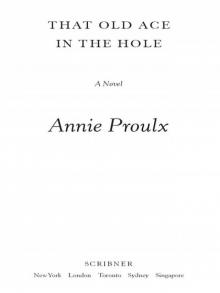 That Old Ace in the Hole
That Old Ace in the Hole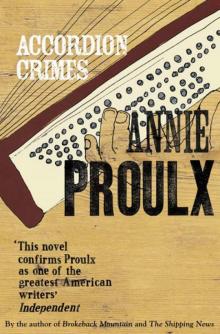 Accordion Crimes
Accordion Crimes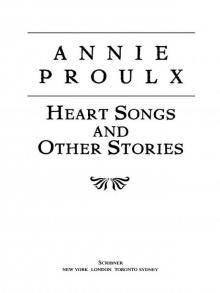 Heart Songs and Other Stories
Heart Songs and Other Stories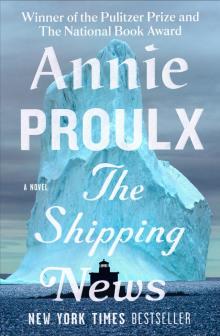 The Shipping News
The Shipping News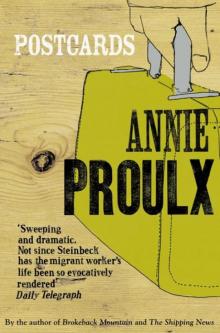 Postcards
Postcards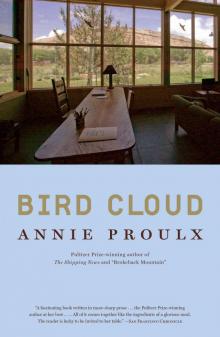 Bird Cloud
Bird Cloud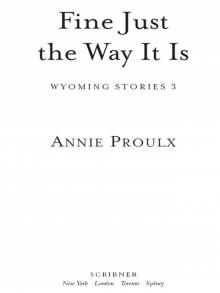 Fine Just the Way It Is
Fine Just the Way It Is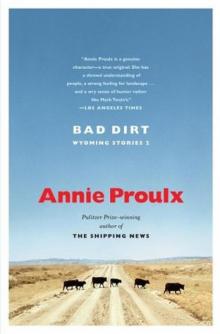 Bad Dirt
Bad Dirt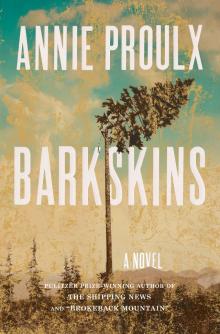 Barkskins
Barkskins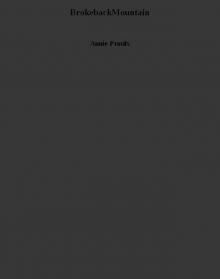 BrokebackMountain
BrokebackMountain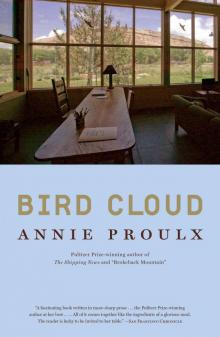 Bird Cloud: A Memoir of Place
Bird Cloud: A Memoir of Place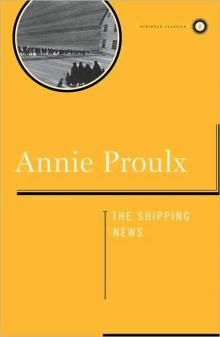 Shipping News_A Novel
Shipping News_A Novel